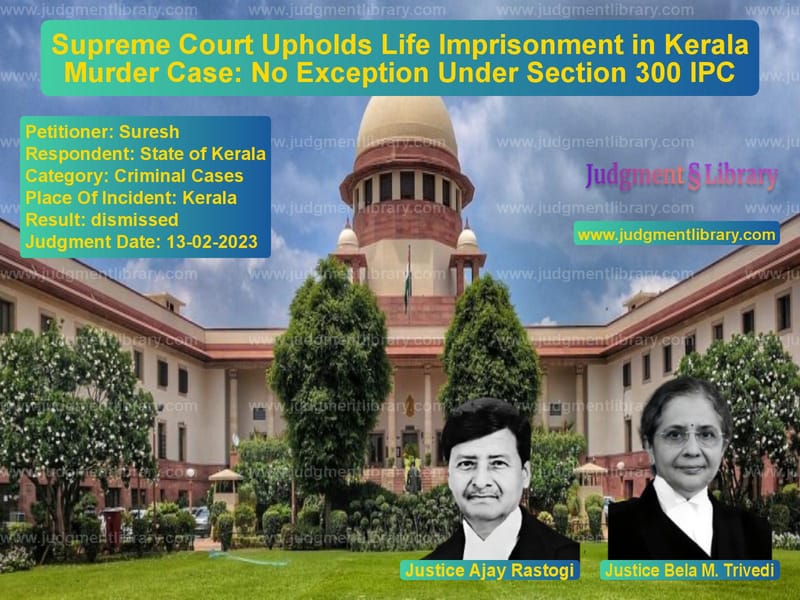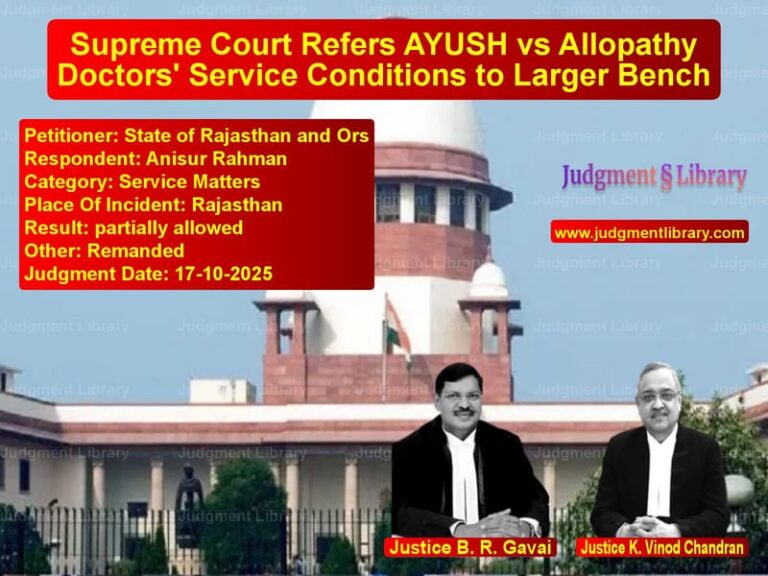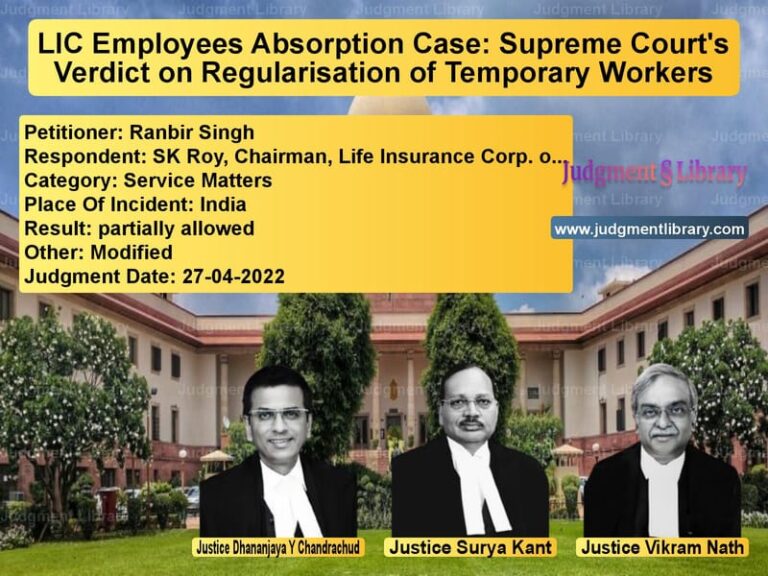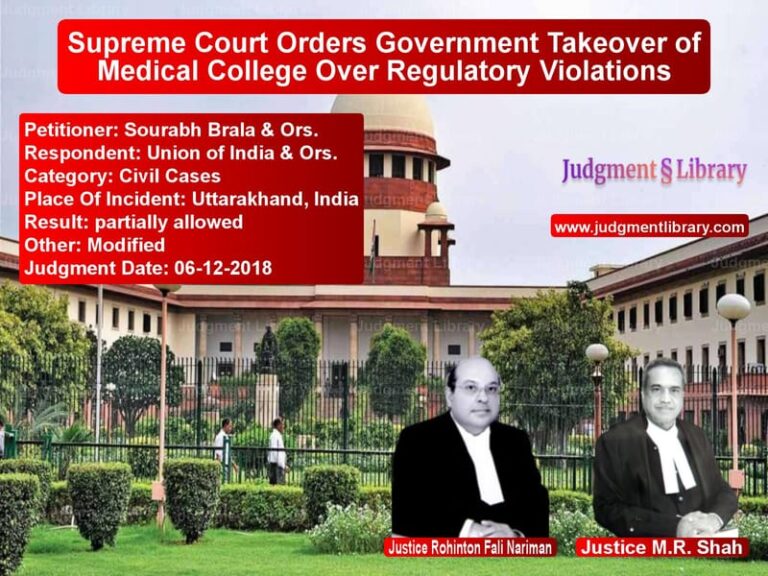Supreme Court Upholds Life Imprisonment in Kerala Murder Case: No Exception Under Section 300 IPC
The Supreme Court of India, in the case of Suresh vs. State of Kerala, ruled on an appeal challenging the conviction of the appellant under Sections 302 and 449 of the Indian Penal Code (IPC). The Court upheld the Kerala High Court’s decision and dismissed the appeal, affirming that the act committed by the accused constituted murder under Section 302 IPC. The Court rejected the plea to reduce the charge to culpable homicide not amounting to murder under Section 304 Part-I IPC.
Background of the Case
The case revolves around the brutal murder of Devarajan, a resident of Siruvani Estate in Kerala. On the night of March 20, 2005, the accused, Suresh, entered the victim’s house and attacked him with a grinding stone, causing severe injuries that led to his death. The prosecution argued that the accused initially had a quarrel with the deceased but later returned to commit the crime when the victim was asleep.
The crime was witnessed by PW-13, the wife of the deceased, who provided a detailed account of the events leading up to the murder. The forensic examination confirmed that the injuries sustained by the victim were consistent with being struck by a grinding stone, supporting the prosecution’s version of events.
Arguments by the Appellant (Suresh)
- The appellant contended that the act was committed in the heat of the moment and should not be considered murder under Section 302 IPC.
- He argued that there was a sudden fight between him and the deceased, and the crime should fall under Section 304 Part-I IPC (culpable homicide not amounting to murder).
- The appellant further pleaded that there was no premeditation, and the incident occurred in the spur of the moment due to provocation.
Arguments by the Respondent (State of Kerala)
- The prosecution contended that the accused had initially fought with the deceased but later returned with the intent to kill.
- They argued that attacking a sleeping victim with a grinding stone demonstrated clear premeditation.
- The prosecution highlighted that the nature of injuries sustained by the victim, as detailed in the post-mortem report, pointed to an intent to cause death.
- They asserted that PW-13’s testimony was credible and was corroborated by other witnesses and forensic evidence.
Supreme Court’s Analysis and Judgment
The Supreme Court reviewed the evidence and findings of the lower courts. The key observations made by the Court were:
- No Sudden Fight: The Court rejected the appellant’s argument that the attack occurred in the heat of the moment. It observed that the accused had an initial confrontation with the deceased but later returned to attack him while he was asleep.
- Premeditation and Intent: The Court noted that the accused entered the victim’s house at night and struck him multiple times with a grinding stone, a heavy object capable of causing fatal injuries. This indicated a clear intent to kill.
- Medical Evidence: The forensic examination revealed that the victim suffered multiple fractures and head injuries consistent with being hit with a heavy object, corroborating the prosecution’s version of the crime.
- Credibility of Witness Testimony: The Court found PW-13’s testimony reliable, as it was consistent and supported by material evidence.
The Court ruled:
“The death of the victim was not caused in the heat of a sudden fight, and it was a case of murder under Section 302 IPC. The attack was deliberate and targeted, ruling out any exception under Section 300 IPC.”
Key Legal Findings
- Definition of Murder vs. Culpable Homicide: The Court clarified that while all murders are culpable homicides, not all culpable homicides amount to murder. In this case, the attack met all the criteria of murder under Section 300 IPC.
- Intention to Cause Death: The extent and nature of injuries proved beyond doubt that the accused had the intent to kill, eliminating any possibility of a lesser charge under Section 304 IPC.
- Role of Forensic Evidence: The forensic analysis played a crucial role in establishing the sequence of events and confirming the credibility of the eyewitness.
Final Verdict
- The Supreme Court dismissed the appeal and upheld the conviction of the appellant.
- The accused was sentenced to life imprisonment under Section 302 IPC and five years of rigorous imprisonment under Section 449 IPC.
- The judgment reaffirmed the principle that attacking a sleeping person with a lethal weapon constitutes murder, leaving no room for exceptions under Section 300 IPC.
Implications of the Judgment
This ruling reinforces the legal distinction between murder and culpable homicide and provides clarity on how courts assess intent in violent crimes. By upholding the life sentence, the Supreme Court ensures that crimes of this nature are met with the strictest legal consequences, preventing any dilution of justice.
Petitioner Name: Suresh.Respondent Name: State of Kerala.Judgment By: Justice Ajay Rastogi, Justice Bela M. Trivedi.Place Of Incident: Kerala.Judgment Date: 13-02-2023.
Don’t miss out on the full details! Download the complete judgment in PDF format below and gain valuable insights instantly!
Download Judgment: suresh-vs-state-of-kerala-supreme-court-of-india-judgment-dated-13-02-2023.pdf
Directly Download Judgment: Directly download this Judgment
See all petitions in Murder Cases
See all petitions in Judgment by Ajay Rastogi
See all petitions in Judgment by Bela M. Trivedi
See all petitions in dismissed
See all petitions in supreme court of India judgments February 2023
See all petitions in 2023 judgments
See all posts in Criminal Cases Category
See all allowed petitions in Criminal Cases Category
See all Dismissed petitions in Criminal Cases Category
See all partially allowed petitions in Criminal Cases Category







